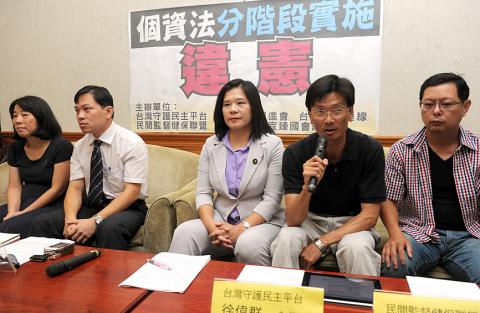The Executive Yuan’s decision to implement the Personal Data Protection Act (個人資料保護法) in two stages was unconstitutional and stands in contempt of the Legislative Yuan, academics and civic groups said yesterday.
“The decision has violated the principle of separation of power of the five branches enshrined in the Republic of China Constitution,” Taiwan Democracy Watch (TWDEM) director Hsu Wei-chun (徐偉群) said.
The Cabinet proposed revisions to four articles of the Personal Data Protection Act and decided that the legislation would take effect in two stages.

Photo: CNA
Approved by the legislature in April 2010, the act was promulgated by President Ma Ying-jeou (馬英九). However, it has yet to take effect because of controversies surrounding the revisions of four articles, which the Ministry of Justice has said would be difficult to implement and have not been approved.
Chiu Wen-tsun (邱文聰) of the Taiwan Association for Human Rights said that the Executive Yuan should have demanded a redrafting of the legislation if it thought it was difficult to implement.
The revision to Article 54 suggested removing the requirement that says financial institutions must inform individuals about the personal information they have that individuals have not provided within one year after the act takes effect. The revision stipulated instead that financial institutions would be mandated to inform individuals of the data they possess if they use or process the information.
The Cabinet revised Article 41 of the act by removing criminal penalty for violations of certain articles of the act when the irregularities were not conducted for the purpose of profit.
Chiu said the revised Article 54 makes it too easy for an institution to get by while the Article 41 only punishes the ones who provide or sell personal information, but not the ones who collect and handle information.
An additional clause also allows certain forms of information collection that “promotes public interests,” which would be “a blank check allowing undue data collection,” Chiu said.
Democratic Progressive Party (DPP) Legislator Wu Yi-chen (吳宜臻) and former DPP legislator Huang Shu-ying (黃淑英) both condemned the administration’s “selective implementation of laws,” saying that would be an infringement of the legislative branch.
“If the administrative branch can choose which part of the legislation to implement, then we don’t need a Legislative Yuan at all,” Huang said, adding that allowing the Executive Yuan to do so would “open a Pandora’s box” because every government agency would follow its example and begin to ignore legislation at will.
Chen Wei-lien (陳維練), director of the justice ministry’s Department of Legal Affairs, said the ministry would like to see the entire law implemented.
“However, certain parts of the legislation are vague and difficult to define and therefore hard to implement,” he said.
Chen added that Taiwan could become the country with the strictest laws on personal information protection in the world under the current proposals.
If the definition and regulation was not clear enough, there would be many controversies once the law is implemented, he said.

Taiwan has received more than US$70 million in royalties as of the end of last year from developing the F-16V jet as countries worldwide purchase or upgrade to this popular model, government and military officials said on Saturday. Taiwan funded the development of the F-16V jet and ended up the sole investor as other countries withdrew from the program. Now the F-16V is increasingly popular and countries must pay Taiwan a percentage in royalties when they purchase new F-16V aircraft or upgrade older F-16 models. The next five years are expected to be the peak for these royalties, with Taiwan potentially earning

STAY IN YOUR LANE: As the US and Israel attack Iran, the ministry has warned China not to overstep by including Taiwanese citizens in its evacuation orders The Ministry of Foreign Affairs (MOFA) yesterday rebuked a statement by China’s embassy in Israel that it would evacuate Taiwanese holders of Chinese travel documents from Israel amid the latter’s escalating conflict with Iran. Tensions have risen across the Middle East in the wake of US and Israeli airstrikes on Iran beginning Saturday. China subsequently issued an evacuation notice for its citizens. In a news release, the Chinese embassy in Israel said holders of “Taiwan compatriot permits (台胞證)” issued to Taiwanese nationals by Chinese authorities for travel to China — could register for evacuation to Egypt. In Taipei, the ministry yesterday said Taiwan

Taiwan is awaiting official notification from the US regarding the status of the Agreement on Reciprocal Trade (ART) after the US Supreme Court ruled US President Donald Trump's global tariffs unconstitutional. Speaking to reporters before a legislative hearing today, Premier Cho Jung-tai (卓榮泰) said that Taiwan's negotiation team remains focused on ensuring that the bilateral trade deal remains intact despite the legal challenge to Trump's tariff policy. "The US has pledged to notify its trade partners once the subsequent administrative and legal processes are finalized, and that certainly includes Taiwan," Cho said when asked about opposition parties’ doubts that the ART was

If China chose to invade Taiwan tomorrow, it would only have to sever three undersea fiber-optic cable clusters to cause a data blackout, Jason Hsu (許毓仁), a senior fellow at the Hudson Institute and former Chinese Nationalist Party (KMT) legislator, told a US security panel yesterday. In a Taiwan contingency, cable disruption would be one of the earliest preinvasion actions and the signal that escalation had begun, he said, adding that Taiwan’s current cable repair capabilities are insufficient. The US-China Economic and Security Review Commission (USCC) yesterday held a hearing on US-China Competition Under the Sea, with Hsu speaking on